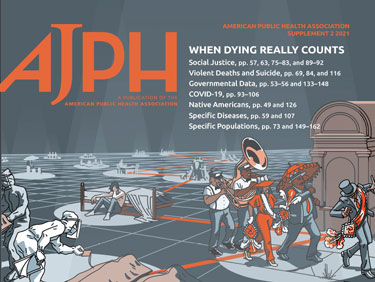To reduce a human life to a statistic can be considered callous. But not so for public health researchers. To tally deaths is to make sure that lives count, especially when it comes to problems that may otherwise be missed, a special issue of APHA’s American Journal of Public Health shows.
Published July 27, “When Dying Really Counts” is supported by the Fielding School of Public Health and the University of California-Los Angeles. Through 26 peer-reviewed studies, articles and commentaries, researchers lay out a case for increasing attention to mortality data.
Many systems that track data on death are incomplete, not comprehensive or not representative. For example, one analysis found that more than 11,000 veterans died by suicide from 2013 to 2017, but the Veterans Health Administration only identified less than 4,000 of those deaths.
“Inaccuracies in mortality data have real consequences for the public health mission,” Vickie Mays, PhD, MSPH, a UCLA professor of health policy and management and guest editor for the special issue, said in a news release.
In the U.S., Black Americans have an estimated 2.8 times greater risk of dying during a police encounter than whites. Using death narratives written for the National Violent Death Reporting System, they found that Black people killed by police were less likely to show threatening behaviors during such encounters, revealing law enforcement biases.
When complete mortality data is uncollected or unreported, it can hide health disparities, often for the most vulnerable groups. Public health must be guided by social justice — otherwise health inequity becomes “normal,” said Mays, who is an APHA member.
The special issue shares information on death disparities during the COVID-19 pandemic, mortality among people in prisons and police custody, and issues such as community grief and the role of funeral directors.
One study examines infant deaths from genetic disorders, finding that records are often incomplete. Over a six-year period ending in 2017, the National Death Index codified only 53% of deaths of infants with diagnosed genetic disorders that had their condition listed as an underlying cause. If such data were included, it could help drive interventions, the researchers said.
Similarly, data on deaths during the pandemic is essential, as it shows which groups are more vulnerable and in need of targeted vaccination outreach.
“There is a need to improve the quality of mortality data and routine surveillance in general,” guest editor Susan Cochran, PhD, said in the news release. “This is especially true for disasters — including when the world is experiencing a global pandemic — and when we are trying to learn from mortality incidents to delay or reduce their occurrence.”
Image by Brittain Peck, courtesy AJPH